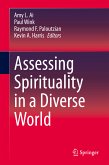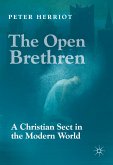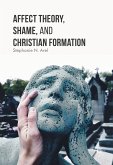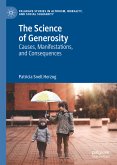Rituals and Practices in World Religions (eBook, PDF)
Cross-Cultural Scholarship to Inform Research and Clinical Contexts
Redaktion: Yaden, David Bryce; Newberg, Andrew B.; Peng, Kaiping; Zhao, Yukun
112,95 €
inkl. MwSt.
Sofort per Download lieferbar

56 °P sammeln
Rituals and Practices in World Religions (eBook, PDF)
Cross-Cultural Scholarship to Inform Research and Clinical Contexts
Redaktion: Yaden, David Bryce; Newberg, Andrew B.; Peng, Kaiping; Zhao, Yukun
- Format: PDF
- Merkliste
- Auf die Merkliste
- Bewerten Bewerten
- Teilen
- Produkt teilen
- Produkterinnerung
- Produkterinnerung

Bitte loggen Sie sich zunächst in Ihr Kundenkonto ein oder registrieren Sie sich bei
bücher.de, um das eBook-Abo tolino select nutzen zu können.
Hier können Sie sich einloggen
Hier können Sie sich einloggen
Sie sind bereits eingeloggt. Klicken Sie auf 2. tolino select Abo, um fortzufahren.

Bitte loggen Sie sich zunächst in Ihr Kundenkonto ein oder registrieren Sie sich bei bücher.de, um das eBook-Abo tolino select nutzen zu können.
Provides the only classification and contextualization of rituals and practices from world religious traditions
Expands analysis of religious and practices beyond yoga and mindfulness
Can be used as a reference for clinicians
Describes three individual practices and three group rituals per world religious tradition
- Geräte: PC
- ohne Kopierschutz
- eBook Hilfe
- Größe: 5.26MB
Andere Kunden interessierten sich auch für
![Assessing Spirituality in a Diverse World (eBook, PDF) Assessing Spirituality in a Diverse World (eBook, PDF)]() Assessing Spirituality in a Diverse World (eBook, PDF)96,95 €
Assessing Spirituality in a Diverse World (eBook, PDF)96,95 €![The Open Brethren: A Christian Sect in the Modern World (eBook, PDF) The Open Brethren: A Christian Sect in the Modern World (eBook, PDF)]() Peter HerriotThe Open Brethren: A Christian Sect in the Modern World (eBook, PDF)68,95 €
Peter HerriotThe Open Brethren: A Christian Sect in the Modern World (eBook, PDF)68,95 €![Judaism and World Religions (eBook, PDF) Judaism and World Religions (eBook, PDF)]() A. BrillJudaism and World Religions (eBook, PDF)72,95 €
A. BrillJudaism and World Religions (eBook, PDF)72,95 €![Sociology of Exorcism in Late Modernity (eBook, PDF) Sociology of Exorcism in Late Modernity (eBook, PDF)]() Giuseppe GiordanSociology of Exorcism in Late Modernity (eBook, PDF)52,95 €
Giuseppe GiordanSociology of Exorcism in Late Modernity (eBook, PDF)52,95 €![Affect Theory, Shame, and Christian Formation (eBook, PDF) Affect Theory, Shame, and Christian Formation (eBook, PDF)]() Stephanie N. ArelAffect Theory, Shame, and Christian Formation (eBook, PDF)88,95 €
Stephanie N. ArelAffect Theory, Shame, and Christian Formation (eBook, PDF)88,95 €![The Sacred in Exile (eBook, PDF) The Sacred in Exile (eBook, PDF)]() Gillian McCannThe Sacred in Exile (eBook, PDF)48,95 €
Gillian McCannThe Sacred in Exile (eBook, PDF)48,95 €![The Science of Generosity (eBook, PDF) The Science of Generosity (eBook, PDF)]() Patricia Snell HerzogThe Science of Generosity (eBook, PDF)80,95 €
Patricia Snell HerzogThe Science of Generosity (eBook, PDF)80,95 €-
-
-
Provides the only classification and contextualization of rituals and practices from world religious traditions
Expands analysis of religious and practices beyond yoga and mindfulness
Can be used as a reference for clinicians
Describes three individual practices and three group rituals per world religious tradition
Expands analysis of religious and practices beyond yoga and mindfulness
Can be used as a reference for clinicians
Describes three individual practices and three group rituals per world religious tradition
Dieser Download kann aus rechtlichen Gründen nur mit Rechnungsadresse in A, B, BG, CY, CZ, D, DK, EW, E, FIN, F, GR, HR, H, IRL, I, LT, L, LR, M, NL, PL, P, R, S, SLO, SK ausgeliefert werden.
Produktdetails
- Produktdetails
- Verlag: Springer International Publishing
- Seitenzahl: 230
- Erscheinungstermin: 3. Februar 2020
- Englisch
- ISBN-13: 9783030279530
- Artikelnr.: 58649750
- Verlag: Springer International Publishing
- Seitenzahl: 230
- Erscheinungstermin: 3. Februar 2020
- Englisch
- ISBN-13: 9783030279530
- Artikelnr.: 58649750
- Herstellerkennzeichnung Die Herstellerinformationen sind derzeit nicht verfügbar.
David Bryce Yaden is a research fellow at The University of Pennsylvania's Positive Psychology Center under the direction of Dr. Martin Seligman. He works in collaboration with neuroscientist Dr. Andrew Newberg of Thomas Jefferson University and The Center for Cognitive Neuroscience at The University of Pennsylvania. His work has been featured in The New York Times, The Wall Street Journal, NPR, Washington Post, and New York Magazine . David recently published a major academic collection, Being Called: Scientific, Secular, and Sacred Perspectives (Praeger, 2015). He has co-authored numerous scholarly papers with Dr. Andrew Newberg and Dr. Martin Seligman. Huffington Post recently named David one of ten Millennials influencing the future of faith and he was interviewed about his last book on NPR. Yukun Zhao is a PhD candidate at Tsinghua University, China. His research focuses on self-determination theory, growth mindset, meaning, and big data. He also serves as the Administrative Director of the Positive Psychology Research Center of the School of Social Sciences of Tsinghua University, and Director of Research Center of Tsinghua Happiness Lab. He is the author of four books including Autonomous Parentingand Positivity in a Negative Era, and translated Martin Seligman's Flourish, Mitchel Resnick's Lifelong Kindergarten, and Alison Gopnick's The Gardener and the Carpenter. Kaiping Peng, PhD, is currently the dean of the school of social sciences, chair of the psychology department at Tsinghua University. Before returning to China in 2009, he was a tenured faculty member at the Department of Psychology of the University of California at Berkeley, the head of the social/personality psychology area in Berkeley, member of the American Psychological Association Leadership Council, executive committee of the Institute of East-Asian Studies at UC Berkeley. He a board member of the International Positive Psychology Association, and numerous other national and international professional academic services. He has published eight books and more than 300 articles and essays on cultural and social psychology, as well as methodological issues of psychology. According to many surveys, he had been the world most cited social psychologist at the associate professor level untill 2007, and one of the most cited Chinese psychologists in the world. His new book on positive psychology has been on the top ten best seller list on Amazon China. Andrew B. Newberg, M.D. is currently the Director of Research at the Marcus Institute of Integrative Health at Thomas Jefferson University and Hospital in Philadelphia. He is also a Professor in the Department of Integrative Medicine and Nutritional Sciences at Thomas Jefferson University. He is the co-author of the books entitled, "The Rabbi's Brain", "Words Can Change Your Brain", "How God Changes Your Brain", "Why We Believe What We Believe", and "Why God Won't Go Away: Brain Science and the Biology of Belief". He is also the author of the books, "Neurotheology: How Science Enlightens Us About Spirituality", "The Metaphysical Mind: Probing the Biology of Philosophical Thought", and "Principles of Neurotheology."
Chapter 1. Preface, Martin Seligman, University of Pennsylvania, Founder Positive Psychology.- Chapter 2. Introduction, Justin McDaniel, University of Pennsylvania, Chair of Religion Dept..- Chapter 3. The Classification, David Yaden, Yukun Zhao, Kaiping Peng, Andrew Newberg.- Chapter 4. Christian Rituals and Practices.- Chapter 5. Jewish Rituals and Practices.- Chapter 6. Islamic Rituals and Practices.- Chapter 7. Hindu Rituals and Practices.- Chapter 8. Buddhist Rituals and Practices.- Chapter 9. Sikh Rituals and Practices.- Chapter 10. Taoist Rituals and Practices.- Chapter 11. Confucian Rituals and Practices.- Chapter 12. Universalist Unitarian Rituals and Practices.- Chapter 13. Indigenous Religions Rituals and Practices.- Chapter 14. Other Religious Traditions Rituals and Practices.- Chapter 15. . Humanist Rituals and Practices.- Chapter 16. Conclusion.
Chapter 1. Preface, Martin Seligman, University of Pennsylvania, Founder Positive Psychology.- Chapter 2. Introduction, Justin McDaniel, University of Pennsylvania, Chair of Religion Dept..- Chapter 3. The Classification, David Yaden, Yukun Zhao, Kaiping Peng, Andrew Newberg.- Chapter 4. Christian Rituals and Practices.- Chapter 5. Jewish Rituals and Practices.- Chapter 6. Islamic Rituals and Practices.- Chapter 7. Hindu Rituals and Practices.- Chapter 8. Buddhist Rituals and Practices.- Chapter 9. Sikh Rituals and Practices.- Chapter 10. Taoist Rituals and Practices.- Chapter 11. Confucian Rituals and Practices.- Chapter 12. Universalist Unitarian Rituals and Practices.- Chapter 13. Indigenous Religions Rituals and Practices.- Chapter 14. Other Religious Traditions Rituals and Practices.- Chapter 15. . Humanist Rituals and Practices.- Chapter 16. Conclusion.







